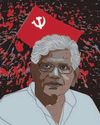
HAVING SUCCESSFULLY TESTED an anti-satellite missile system in March, and then coming within 2.1km of soft-landing a rover near the south pole of the moon, our military and space scientists have two creditable achievements this year. Space offers an asymmetrical advantage to nations that can penetrate it, in terms of their capability to fulfil the needs of their people, security of the nations and, ultimately, economic leverage.
Post-World War II, there was a surge in space capabilities in developed nations at the civil and strategic levels. The Soviet Union and the United States took the lead in developing the requisite technologies and industrial base through national policies with a competitive spirit. European nations followed suit, as soon as they recovered from the trauma of the war.
We were not far behind. Driven by the vision of Dr Vikram Sarabhai and the systematic nurturing of mission mode programmes and procedures by Professor Satish Dhawan, India’s space mission has taken major strides. We have indigenously created state-of-the-art technologies and an associated indigenous supply chain to build systems, ground infrastructure and space assets. It is to our credit that all these were achieved in the backdrop of repeated technology sanctions and denial regimes, imposed by the west.
Militarisation of space is the development of weaponry and associated technologies for application in outer space to gain a definite edge over one’s adversaries. The first steps towards militarisation of space were taken soon after the Second World War by the two superpowers, the USSR and the USA. The initial intent was to remotely monitor the enemy’s strategic assets and the technologies they were developing.
Denne historien er fra September 22, 2019-utgaven av THE WEEK.
Start din 7-dagers gratis prøveperiode på Magzter GOLD for å få tilgang til tusenvis av utvalgte premiumhistorier og 9000+ magasiner og aviser.
Allerede abonnent ? Logg på
Denne historien er fra September 22, 2019-utgaven av THE WEEK.
Start din 7-dagers gratis prøveperiode på Magzter GOLD for å få tilgang til tusenvis av utvalgte premiumhistorier og 9000+ magasiner og aviser.
Allerede abonnent? Logg på

Themes Of Choice
As Savvy Investors Seek New Avenues, Thematic Mutual Funds Are Gaining Popularity

A golden girl
One of India's most formidable beauties passed away earlier this month. The odd thing is she would absolutely hate this obituary; she hated being written about and avoided publicity for all of her nine decades. Indira Aswani was 93 when she died. But anyone who encountered her, even briefly, was in such awe of her grace and poise, and one could not but remember her forever.

The interest in wine is growing delightfully in India
The renowned British wine writer and television presenter Jancis Robinson, 74, recently came to Delhi and Mumbai to reacquaint herself with India's wine industry. This was the Robinson's fourth visit to India; the last one was seven years ago. On this trip, Robinson and her husband, restaurateur Nicholas Lander, were hosted by the Taj Hotels and Sonal Holland, India's only Master of Wine.

United in the states
Indian-Americans coming together under the Democratic umbrella could get Harris over the line in key battlegrounds

COVER DRIVE
Usage-driven motor insurance policies offer several benefits

GDP as the only measure of progress is illogical
Dasho Karma Ura, one of the world's leading happiness experts, has guided Bhutan's unique gross national happiness (GNH) project. He uses empirical data to show that money cannot buy happiness in all circumstances, rather it is family and health that have the strongest positive effect on happiness. Excerpts from an interview:

India is not a controlling big brother
Prime Minister Tshering Tobgay considers India a benevolent elder sibling as the \"big brotherly attitude\" is happily missing from bilateral ties. He thinks the relationship shared by the two countries has become a model of friendship not just for the region, but for the entire world. \"India's attitude is definitely not of a big brother who is controlling and does not allow the little brother to blossom and grow,\" says Tobgay in an exclusive interview with THE WEEK.

Comrade with no foes
Lal Salaam, Comrade Yechury-you were quite a guy!

Pinning down saffron
In her first political bout, Vinesh Phogat rides on the anti-BJP sentiment across Haryana

MAKE IN MANIPUR
Home-made rockets and weapons from across the border are escalating the conflict